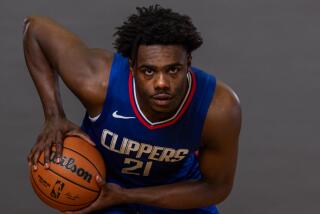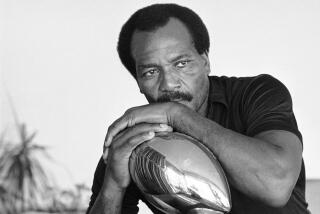This Former Oriole Pitcher Wasn’t Too Skinny
- Share via
BALTIMORE — Watching Harold (Skinny) Brown throw a baseball wasn’t exactly an intimidating experience. Fastball, knuckler, slider. He mixed them as a scientist would integrate elements in a chemistry lab. Result: A competitive-type pitcher who kept hitters off-balance and tempted them into a commitment even when they were trying to be patient.
Brown served the Baltimore Orioles with distinction for eight years with his diversified abilities. They sold him to the New York Yankees in 1962 for what was intended to be “pennant insurance.” That was the Yankee way, to protect themselves for the September drive.
Bobby Richardson, the second baseman, welcomed him to his new team and said, “It’s nice to have you not going against us. You made us swing a lot of times when we really weren’t ready. Usually, it was a fly ball out. We were in a hurry when it looked good because we didn’t want to wait around and see what you might try to do to us later.”
The first time Brown made an appearance in Baltimore, he was warming up in the bullpen, then located along the right-field foul line. “I was ready to go in the game in relief,” he recalled, “and this old gal got up and screamed, ‘The more they come the worse they get.’ I think so often of that rather unusual welcome to Baltimore and it always gives me a chuckle.”
Brown, his wife, Maxine, two daughters, their husbands and grandchildren are guests for the weekend of the Oriole Advocates, who are about to enshrine him in the team’s Hall of Fame. It’s a moment that merits special attention. “You have no idea how important this is, considering I was a part of the early building years of the Orioles. To be remembered now is what counts.”
Within the time frame of July 1 to Aug. 8, 1961, Brown didn’t allow a run. He compiled 36 scoreless innings (24 without a walk) and had three complete-game shutouts. There were other occasions, too, that set him apart. A one-hitter against the Yankees, when “Skinny” gave a home run to Mickey Mantle in the first inning and then nothing more, as Ron Hansen homered to give the Orioles a 3-1 win.
The most unusual experience of all unfolded in Brown’s first year, 1955, with the Orioles. Bill Wight was pounded for five runs in the first inning against the Cleveland Indians and, finally, turned the ball over to Brown. The Indians never got another hit as Brown struck out 10 in an exceptional performance.
It became the “no-hitter that wasn’t a no-hitter.” Brown became a footnote in baseball history, a pitcher who authored a “no-hitter” yet wasn’t the winner or the loser. After a year at the University of North Carolina and service in World War II, Brown, who signed for a bonus of $1,500 with the Boston Red Sox in 1946 and a salary of $250 a month for their Roanoke farm club of the Piedmont League, never made more than $22,500 in his major-league career.
“I’m happy to say I was never asked to take a cut. In those days, you felt fortunate to get a little pay boost every year. Then you always had a job in the offseason.”
Brown’s knuckler was his “out” pitch but exceptional control allowed him to minimize mistakes and keep the ball out of the power zone of opposing hitters. He threw the knuckler as a high school player and was encouraged to rely on it by Manager Paul Richards when they were together at Seattle in the Pacific Coast League.
“I remember a fine catcher named Bill Salkeld came down from the major leagues and didn’t call for it too often. After the game, Richards called me in his office and said, ‘Pitch your own way. Throw what you want to throw, not what the catcher wants you to throw. It’s your future, not his. If you get hammered it counts against you, not him.”
Brown, now in the heating-air conditioning business in Greensboro, N.C., pitched his way to the majors when baseball was at its competitive best, only 16 teams with 23-man player limits, and stayed 14 seasons. Now there’s another moment to savor, a “homecoming” 29 years after he threw his last pitch as an Oriole.
More to Read
Go beyond the scoreboard
Get the latest on L.A.'s teams in the daily Sports Report newsletter.
You may occasionally receive promotional content from the Los Angeles Times.










